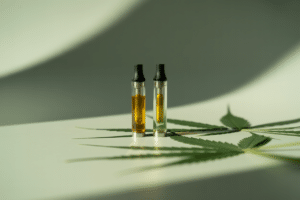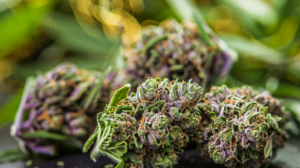- Complete guide to using marijuana for stress, sleep & holistic healing
Cannabis for Wellness: Natural Health Solutions

Contents
Contents
Did you know over 35% of U.S. adults have used cannabis for wellness?
This trend is growing as more people seek natural remedies (natural remedies). The world is recognizing how cannabinoids can help. From CBD creams to THC drops, there are numerous options for different health needs. Learning about cannabis can enhance your self-care routine, much like yoga or meditation, and can be a valuable addition to your wellness journey.
Research shows how cannabis supports our body’s natural systems. Places like Farmacy Berkeley are leading the way in health-focused cannabis use, offering innovative options for well-being.
Understanding Cannabis and Its Components
Cannabis is a plant known for its health benefits, thanks to its over 120 cannabinoids like THC and CBD. These compounds play significant roles in the plant’s effects and medicinal properties. Exploring cannabinoids helps us understand how cannabis contributes to health.

What are Cannabinoids?
Cannabinoids are compounds in cannabis that interact with our body’s endocannabinoid system, which regulates appetite, pain, mood, and immune functions. For instance, CBD can reduce blood pressure and inflammation, while THC helps with pain and appetite.
The Difference Between THC and CBD
THC and CBD both come from cannabis but have different effects. THC affects mood and induces a high, whereas CBD doesn’t have psychoactive effects and is valued for its therapeutic potential. An FDA-approved medicine, Epidiolex, containing CBD, is used to treat certain epilepsies. Understanding the difference is crucial for informed medicinal use.

The Role of Cannabis in Holistic Health
Cannabis interacts with the body’s endocannabinoid system to help regulate mood, sleep, and pain. By engaging with this system, cannabis can support holistic health and help maintain balance.
How Cannabis Supports the Endocannabinoid System
Cannabis contains cannabinoids like THC and CBD that connect with parts of the brain and immune system. This interaction can influence pain perception and reduce nausea, particularly for those dealing with chronic pain. Such effects highlight its role in promoting holistic health.
Integrating Cannabis into Your Health Routine
There are various ways to incorporate cannabis into your health plan—oils, tinctures, or topical products can enhance daily well-being beyond pain relief. Carefully adding cannabis to your routine supports your overall health journey.
Cannabis for Wellness: A Natural Health Solution
Cannabis is increasingly popular for natural health solutions, addressing needs like stress relief and sleep improvement. With the wellness supplement market reaching $215.66 billion in 2020, people are embracing products like CBD to improve their quality of life.
A significant number of adults report worsening mental health since the pandemic, with about 35.2% feeling anxious. Cannabis, especially CBD, is often used to relax, manage pain, or improve sleep. With medical marijuana legalized in 38 states, it’s becoming a mainstream health aid.
Medical Marijuana Benefits
Medical marijuana isn’t just for recreational purposes—it’s being recognized for its therapeutic potential. It helps alleviate chronic pain, anxiety, and depression, supported by a wealth of research.
Pain Relief and Management
Numerous studies indicate that medical marijuana is highly effective for chronic pain management, whether due to arthritis, nerve damage, or other causes. It can be administered in various ways, making it accessible for those in need.
Potential Mental Health Benefits
Research increasingly points to CBD as a valuable tool in mental health, helping with anxiety, PTSD, and depression. The FDA-approved CBD drug Epidiolex exemplifies its potential in treating challenging conditions.
Cannabis-Infused Wellness Products
The demand for cannabis-infused wellness products continues to rise. From oils and creams to edibles, these products are revolutionizing self-care. For instance, topicals are popular for targeted pain relief and skincare.
Topicals and Creams for Pain Relief
Cannabis-infused topicals, including creams and transdermal patches, offer solutions for pain management and skincare issues like dryness and redness. These options make it easier for users to find relief in convenient formats.
Edibles and Tinctures for Relaxation and Sleep
Edibles like fruit chews or drinks are a fun, effective way to use cannabis for relaxation or sleep enhancement. These products allow users to seamlessly integrate cannabis into their lifestyle.

The Future of Cannabis in the Wellness Industry
With changing attitudes and legalization trends, the future of cannabis looks promising. By 2030, the U.S. legal cannabis market is expected to reach $71 billion. The increased understanding of its health benefits continues to drive this growth, making cannabis a key player in the wellness industry.
Trends in Legalization and Acceptance
The ongoing shift in legalization and societal attitudes toward cannabis highlights its potential in natural health care. Cannabis use has risen significantly, reflecting broader acceptance of its therapeutic value.

Conclusion
Cannabis for wellness is a promising path for many, offering potential health benefits through its active components, THC and CBD. It’s crucial to stay informed and up-to-date as research progresses. With more studies and innovative products, cannabis is proving to be a key element in a modern, holistic approach to health. For those exploring natural ways to enhance well-being, cannabis offers a unique, adaptable solution.
FAQ
1. What are the main benefits of using cannabis for wellness?
Cannabis helps with pain relief, eases anxiety and stress, and improves sleep. It acts as a natural remedy for inflammation. The key components, CBD and THC, have therapeutic effects that contribute to overall well-being.
2. How does the endocannabinoid system (ECS) function in relation to cannabis?
The endocannabinoid system plays a big role in regulating mood, pain, and sleep. When you use cannabis, cannabinoids interact with this system, helping to maintain balance and support overall health.
3. How can I incorporate cannabis into my daily health practices?
Cannabis can be used in various forms, such as oils, creams, or edibles. Think about your health goals, then choose products that align with those objectives, whether it’s pain relief, relaxation, or improving sleep.
4. Are there specific cannabis-infused wellness products I should consider?
There are many options, including topicals for targeted pain relief, edibles for stress reduction, and tinctures for enhanced sleep. Selecting products that best suit your lifestyle and needs will help you achieve your wellness goals.
5. What research supports the use of CBD for health benefits?
Studies show that CBD can help reduce anxiety, inflammation, and pain. The FDA-approved medication Epidiolex is a notable example of CBD‘s medical benefits, specifically for epilepsy.
6. What are the potential risks of using cannabis?
While cannabis has many benefits, it also carries risks like dependence, especially with THC-heavy products. Issues around product quality and regulation are also concerns. Staying informed and cautious can help mitigate these risks.
7. What is the future of cannabis in the wellness industry?
With increasing acceptance and legalization, cannabis is becoming a major player in the wellness industry. As research continues and societal attitudes evolve, cannabis is likely to become a staple in natural health care.
Disclaimer: Please consult a healthcare professional before incorporating cannabis products into your routine. The information provided in this article is for educational purposes only and should not be taken as medical advice.
Subscribe: Stay updated on the latest wellness trends, cannabis research, and exclusive offers by subscribing to our newsletter. Join our community and enhance your journey to well-being.




